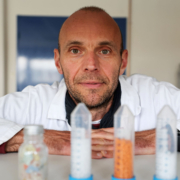Copyright : Laboratoire LEMAR- 2018
Fabrice Brunel (CP2M, UCB Lyon1), Arnaud Huvet et Ika Paul-Pont pour le Lemar
National
ANR (CES06)
Start Date
03/04/2025
End Date
03/04/2025
Plastic waste has become a highly abundant and a worldwide growing problem. Following their photo-degradation, they are progressively fragmented into micro/nano-plastics (MNP) which are easily integrated into the food chain with possible toxic effects. Most of the reported toxicity tests use commercially available MNP, i.e. with very little representativeness of real NP/MP. Additionally, most studies concern polystyrene (PS) particles whereas polyethylene (PE) particles are by far the most common in aquatic environments. In that context, the aim of the present proposal is to develop realistic PE particles with controlled size and composition which will then be used to investigate the impact of PE debris on marine species and ecosystem functioning. For this purpose, we will benefit from the complementary expertise of three partners (CP2M, IMMM and IPC) in the synthesis, formulation and physico-chemical characterization of a broad range of PE particles. These PE particles will be used to improve the environmental relevance of ecotoxicological studies mastered by the fourth partner (LEMAR) by providing data on the toxicity of the produced and used polymer (PE), for which toxicity data are fragmentary and limited to particles > 10 µm. In this project, we will focus on the two main mechanisms of toxicity identified so far: the chemical toxicity of leaching plastic additives during plastic ageing, and the nanotoxicity interacting with biological membranes.
















